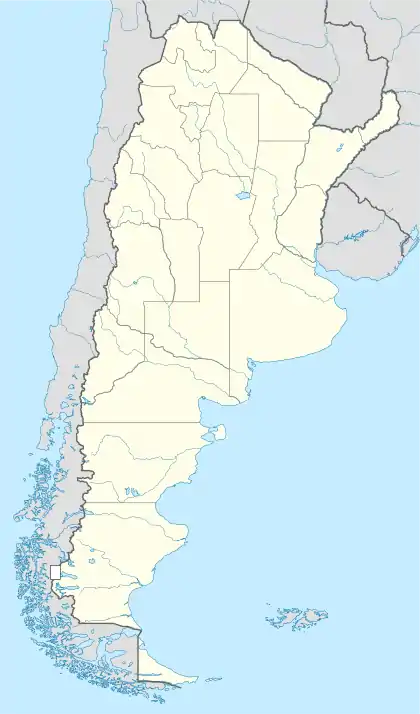Bernardo de Irigoyen, Misiones
Bernardo de Irigoyen is a city in the province of Misiones, Argentina. It has 10,889 inhabitants as per the 2001 census [INDEC], and is the head town of the General Manuel Belgrano Department. It carries the name of prominent politician and diplomat Bernardo de Irigoyen.
Bernardo de Irigoyen | |
|---|---|
 Coat of arms | |
 Bernardo de Irigoyen Location of Bernardo de Irigoyen in Argentina | |
| Coordinates: 26°15′S 53°59′W | |
| Country | |
| Province | |
| Department | General Manuel Belgrano |
| Area | |
| • Total | 1,064 km2 (411 sq mi) |
| Elevation | 835 m (2,740 ft) |
| Population (2001 census) | |
| • Total | 10,889 |
| • Density | 10/km2 (27/sq mi) |
| Time zone | UTC−3 (ART) |
| CPA base | N3366 |
| Dialing code | +54 3741 |
Location
The city is located in the easternmost point of Argentina, on the border with Brazil, next to Dionísio Cerqueira (state of Santa Catarina) and Barracão (state of Paraná), an important entrance to the country. It lies on Barracón Hill, at an altitude of 835 m, the highest point in Misiones, by National Route 14, which connects the Argentine Mesopotamia with other regions.
The municipality contains part of the 84,000 hectares (210,000 acres) Urugua-í Provincial Park, created in 1990.[1]
Climate
Bernardo de Irigoyen has a subtropical highland climate with abundant rainfall in every season (Cfa in Köppen climate classification, closely bordering a Cfb as the warmest month averages exactly 22°C). Due to its elevation, it has the coolest climate among the cities of the Misiones province, with an annual mean of 18,3°C.
| Climate data for Bernardo de Irigoyen, Misiones (1982–1998, extremes 1984–2016) | |||||||||||||
|---|---|---|---|---|---|---|---|---|---|---|---|---|---|
| Month | Jan | Feb | Mar | Apr | May | Jun | Jul | Aug | Sep | Oct | Nov | Dec | Year |
| Record high °C (°F) | 34.2 (93.6) |
34.3 (93.7) |
35.7 (96.3) |
31.2 (88.2) |
29.1 (84.4) |
26.0 (78.8) |
27.3 (81.1) |
31.8 (89.2) |
34.0 (93.2) |
33.2 (91.8) |
32.8 (91.0) |
34.7 (94.5) |
35.7 (96.3) |
| Average high °C (°F) | 28.1 (82.6) |
26.7 (80.1) |
26.5 (79.7) |
23.7 (74.7) |
20.5 (68.9) |
19.0 (66.2) |
19.2 (66.6) |
21.7 (71.1) |
22.3 (72.1) |
24.2 (75.6) |
26.4 (79.5) |
27.7 (81.9) |
23.8 (74.8) |
| Daily mean °C (°F) | 22.0 (71.6) |
21.2 (70.2) |
20.8 (69.4) |
18.6 (65.5) |
15.8 (60.4) |
14.3 (57.7) |
14.2 (57.6) |
16.4 (61.5) |
16.5 (61.7) |
18.2 (64.8) |
20.2 (68.4) |
21.5 (70.7) |
18.3 (64.9) |
| Average low °C (°F) | 19.1 (66.4) |
18.2 (64.8) |
17.8 (64.0) |
15.7 (60.3) |
13.0 (55.4) |
11.3 (52.3) |
11.0 (51.8) |
13.2 (55.8) |
13.1 (55.6) |
15.2 (59.4) |
16.9 (62.4) |
18.4 (65.1) |
15.2 (59.4) |
| Record low °C (°F) | 9.8 (49.6) |
9.1 (48.4) |
5.9 (42.6) |
1.7 (35.1) |
−1.0 (30.2) |
−1.7 (28.9) |
−3.7 (25.3) |
−3.1 (26.4) |
−0.5 (31.1) |
2.5 (36.5) |
5.1 (41.2) |
7.7 (45.9) |
−3.7 (25.3) |
| Average precipitation mm (inches) | 184.2 (7.25) |
237.3 (9.34) |
174.3 (6.86) |
196.2 (7.72) |
216.4 (8.52) |
208.5 (8.21) |
159.8 (6.29) |
145.8 (5.74) |
193.9 (7.63) |
245.3 (9.66) |
209.7 (8.26) |
173.9 (6.85) |
2,345.3 (92.33) |
| Average relative humidity (%) | 73 | 79 | 75 | 76 | 72 | 75 | 71 | 68 | 71 | 77 | 70 | 72 | 73 |
| Source 1: Secretaria de Mineria[2] | |||||||||||||
| Source 2: Servicio Meteorológico Nacional (extremes)[3] | |||||||||||||
References
- Parque Provincial "Urugua-í" (in Spanish), Ministerio de Ecología y RNR de la Provincia de Misiones, archived from the original on 2016-08-21, retrieved 2016-11-09
- "Provincia de Misiones - Clima Y Meteorologia" (in Spanish). Secretaria de Mineria de la Nacion (Argentina). Archived from the original on September 26, 2011. Retrieved July 6, 2015.
- "Clima en la Argentina: Guia Climática por Bernardo de Irigoyen Aero". Caracterización: Estadísticas de largo plazo (in Spanish). Servicio Meteorológico Nacional. Archived from the original on 2017-09-04. Retrieved 4 October 2017.
- Municipal information: Municipal Affairs Federal Institute (IFAM), Municipal Affairs Secretariat, Ministry of Interior, Argentina. (in Spanish)